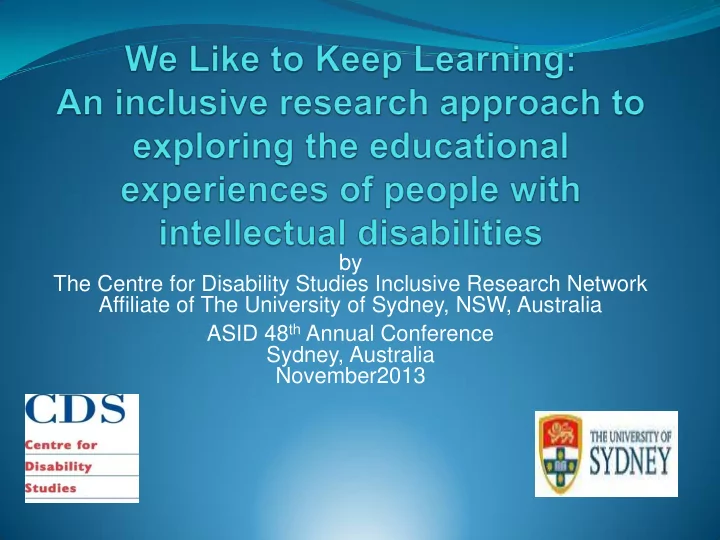

by The Centre for Disability Studies Inclusive Research Network Affiliate of The University of Sydney, NSW, Australia ASID 48 th Annual Conference Sydney, Australia November2013
What is the Centre for Disability Studies Inclusive Research Network? We are a group of co-researchers with intellectual disabilities, their supporters and university researchers from CDS, Sydney. We do research together. We have been working together since 2010 Our members have changed over time but we are still very keen to do research together “Nothing About Us Without Us”
Some of Our Inclusive Research Network Members
Developing Research Skills Workshops and monthly meetings over 3 years Beginning skills in Developing research questions Ways of gathering information Research ethics Developing interview guides Interviewing skills Analysing the interview information (data) Preparing presentations
What is our research about? We wanted to do research about the rights of people with intellectual disability We learned about the UN Convention on the Rights of Persons with Disabilities We were interested to find out what are the everyday experiences of people with intellectual disabilities of the rights covered in the Convention We learned that not a lot of research has been done in this area
Rights to Education We have looked at peoples’ rights in the areas of health, housing, education and employment This presentation looks at one of these rights – that of education Article 24 of the Convention says that people with disabilities have the right to education and the right to realise this without discrimination and on the basis of equal opportunity Our research question is “What are the experiences of people with intellectual disability around their right to education?”
How we did the research We decided that individual interviews were the best way to get the information we needed So we developed a series of questions on rights around education and learning One co-researcher with intellectual disability and one without conducted the interviews with 24 people with intellectual disability The study was approved by the University of Sydney’s Human Research Ethics Committee
What we found out
People Learn in Different Ways Lifelong learning – learning all the time Formal and informal learning Formal learning – TAFE, accredited online courses, traineeships, industry based courses Informal learning – learn by being and doing with others, e.g. radio club, knitting with friends, volunteer work All learning experiences are valued
Experiences of Education 1. Aspirations for the future 2. Getting going 2. Finding out what it’s like 3. Staying the course
1. Aspirations for the future So I’ve been a teacher’s Aide for two and a half years. To finish a course I’m hoping to combine sports and movies. Coaching and teacher’s aide Work and hopefully one day I’ll be working in a mainstream School doing both jobs. Would really like to do a photography course A radio course...I want one of those jobs. And my goals, well, basically to attempt to create a game with what I know. My knowledge. Gradually build upon it, extend it. Who knows. I might become famous!
2. Getting going I haven’t done the course …. They (the staff) don’t No, not yet, but I’d know much about like to go there to the course...need have a look at it. I’d information like to have a look at Want to calm that course. down first....in my head I’ve done the computer course, but I don’t know about any other courses Some courses are very hard for disability people to do I’m still just trying to figure out how to clean my home properly
3 . Finding out what it’s like Learning is hard Some courses are very hard They cost a bit of money – for disability people to do. and I don’t have much to Too fast, can’t keep up spare……. It’s dark when it finishes … don’t like the trains then Never been taught To read and write Want to learn to There was a good Read and write first teachers aide who helped me The staff at my house help me practice Having the Hh opportunity to try the course first
4. Staying the course ...I met some good people and I At school, I had been formed good friendships with them. I’m thankful for that. It’s just in situations of bullying. That was that I felt overlooked by mainly during primary certain....students school... ...At first I might find it nerve- wracking, but to get to know who everyone is, and the teachers, People not understanding your but I find it very...well...scary day-to-day life, your disability... I don’t want to deal with this person. Being negative towards a person with a disability.
Some Reflections on Our Work Participants told us: People with an intellectual disability want to learn and to keep learning They learn in formal and informal ways But learning is hard for many. So good information and support is needed Good experiences with others in the course is also important. They want to feel part of the group And under the Convention, they have a right to education
Some Reflections on Our Work The lived experience of rights The broadening of the research family Recognising and valuing the diversity of expertise among the group Working within the traditional research system Additional time and resources needed in inclusive research efforts But an exciting journey lies ahead!
Thank you for your attention
Members of Our Group Patricia O’Brien Susan Adrian Lisa Hamilton Jodie Airey Suzie Jessep Glen Pudney Sarah Butler Marie Knox Mark Walters Alex Butters Lesley Lewis Alex Papas Julie Deane Annie Mills Elizabeth Young Bruce O’Brien Robert Griffiths
For more information please contact the Inclusive Research Network Centre for Disability Studies Phone: 02 9036 3600 Or patricia.obrien@sydney.edu.au
Recommend
More recommend